#veepstakes
Explore tagged Tumblr posts
Text

(Source)
#destiel#kamala harris#tim walz#veepstakes#us politics#politics#vice president#us election 2024#election 2024#us elections#castiel#dean winchester#breaking news
4K notes
·
View notes
Text
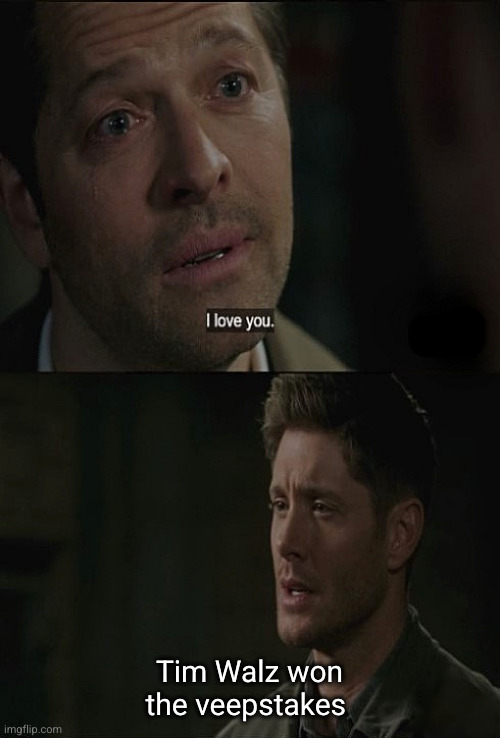
#politics#us politics#veepstakes#tim walz#harris walz#harris 2024#kamala harris#LETS FUCKIN GOOO#i hope this is how some of yall find out#walz
291 notes
·
View notes
Text
Courtney Hagle at MMFA:
Politico journalist Alex Isenstadt’s forthcoming book about President-elect Donald Trump’s return to the White House reportedly claims that Trump “seriously considered tapping Fox Business anchor Maria Bartiromo as his running mate, before being talked out of it by his team.” According to a January 8 report by CNN, Isenstadt writes that Bartiromo was a “Trump favorite” for her fervent defenses and softball interviews of the president-elect. As per Isenstadt, Trump “was dead serious about Bartiromo and was making the case for her" to be his running mate, but ultimately there “was no time to vet Bartiromo, as they had spent months doing with other candidates." Bartiromo repeatedly used her Fox show to fan the conspiratorial flames during the 2020 election and its aftermath. When she interviewed Sidney Powell about “voting irregularities” in November 2020, Bartiromo was aware that the Trump lawyer would “respond with conspiracy theories about Dominion” based on sources that Powell admitted herself were “pretty wackadoodle” — yet Bartiromo still gave credibility to Powell’s “far-fetched claims.” The lawsuit filings revealed that Fox News knew about Bartiromo’s conspiratorial coverage but did little to stop it, with executives privately lamenting that Bartiromo amplified “GOP conspiracy theorists.” Bartiromo also used the right-wing social media app Parler to push a slew of election conspiracy theories. Bartiromo was instrumental in advancing 2020 election conspiracy theories that led to the January 6 insurrection, particularly the claims that Dominion and Smartmatic voting machines flipped votes. The companies sued Fox News and other conservative media outlets for spreading these bogus conspiracy theories, and Fox ultimately settled with Dominion for $787 million. Bartiromo was repeatedly named throughout the various lawsuits, and it was later revealed that she took directives from the Trump campaign to promote the plan to overturn the 2020 presidential election results.
According to Politico’s Alex Isenstadt’s new book Revenge: The Inside Story Of Trump’s Return To Power, Donald Trump reportedly wanted Fox “Business”/Fox “News” propagandist Maria Bartiromo to be his running mate. That job ultimately went to Ohio Senator JD Vance, and the ticket then won this past November.
#Maria Bartiromo#Donald Trump#Alex Isenstadt#Politico#2024 Veepstakes#Veepstakes#2024 Presidential Election#2024 Elections#Revenge: The Inside Story Of Trump’s Return To Power#FBN#FNC#Fox Business#Fox News#Dominion v. Fox News
36 notes
·
View notes
Text
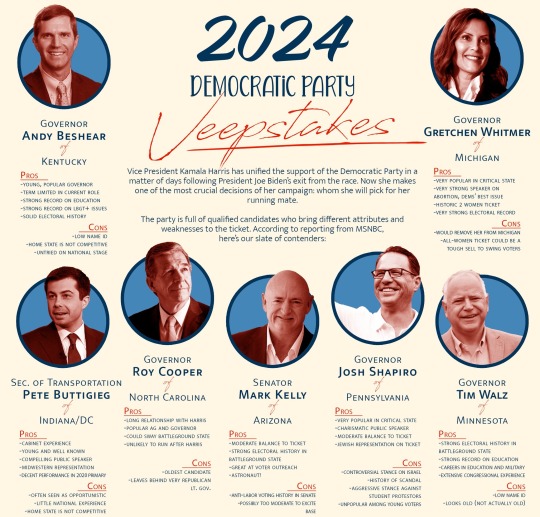
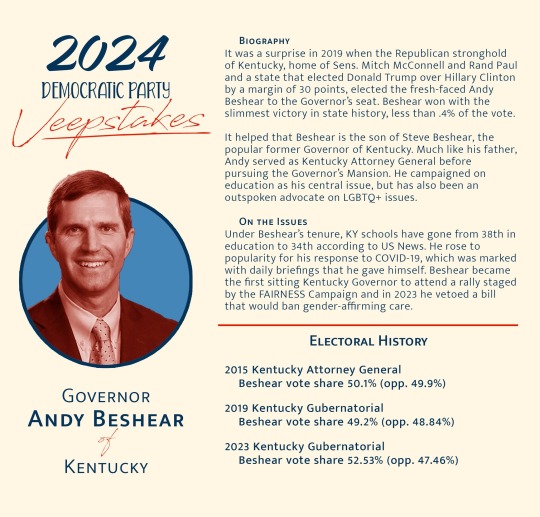
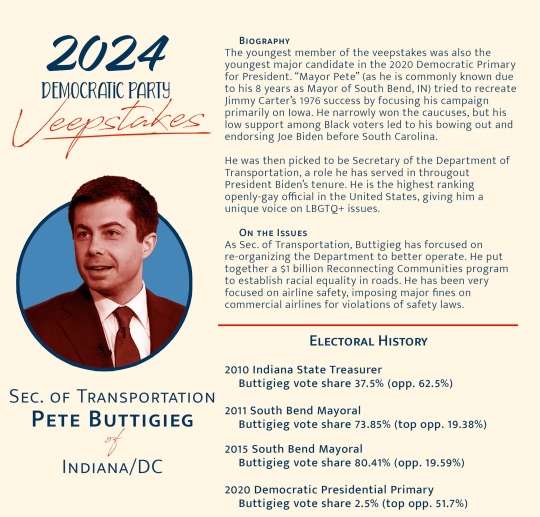
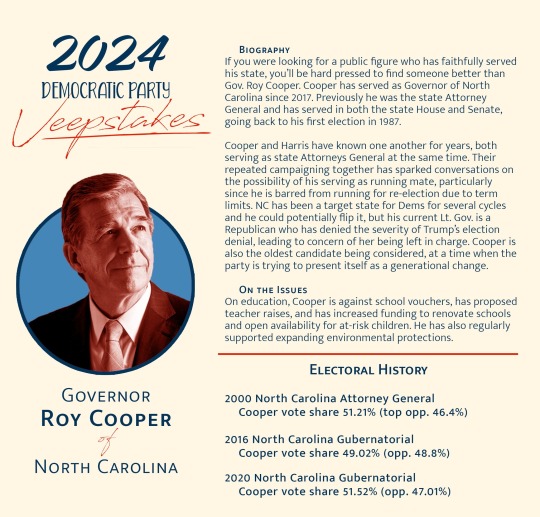
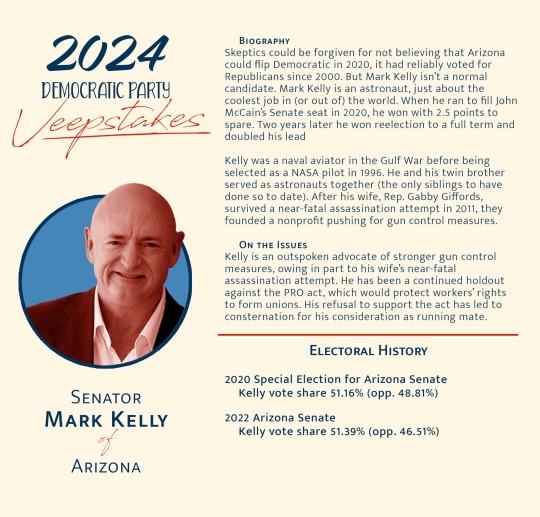
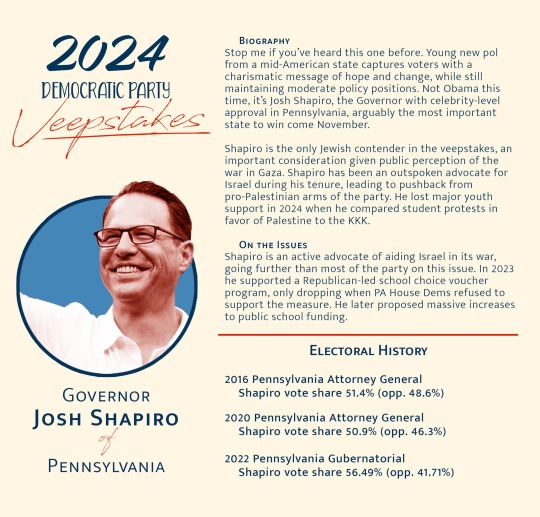
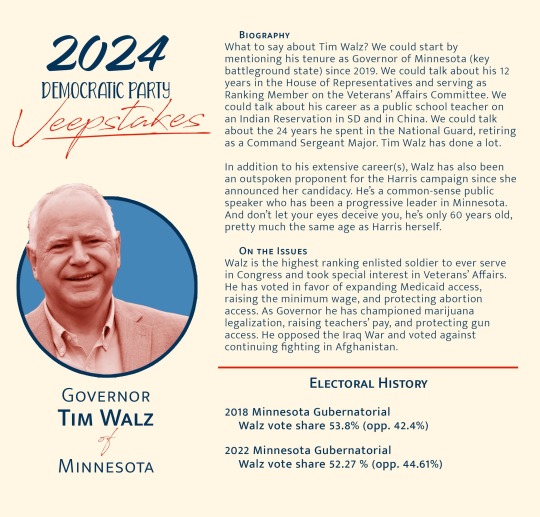
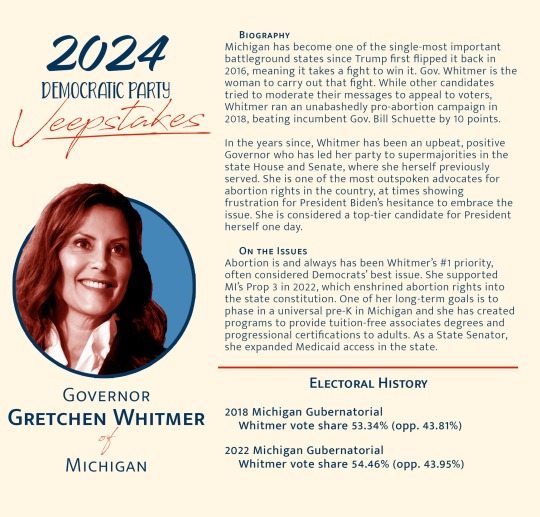
Trying to better understand the picks for Vice President? I’ve got you! According to MSNBC, these are the current individuals being vetted to be Kamala Harris’s running mate.
37 notes
·
View notes
Note
I don't understand why news stories about JD Vance keep mentioning that he's the most unpopular non-incumbent VP candidate since 1980. Unless they're talking about John Anderson (maybe? who knows?), that would've been the Reagan-Bush ticket, and they won! Maybe the VP choice really doesn't have that much impact on elections?
I think they're just using 1980 as a starting point, not as a comparable example. George H.W. Bush was an excellent choice as Reagan's running mate. He brought ideological balance to the ticket, was extremely qualified, and unified the party (he was Reagan's closest challenger for the nomination in the 1980 Republican primaries). The better example for a horrible VP pick would be, as I have seen mentioned in some places, George McGovern's disastrous choice of Thomas Eagleton in 1972, which ultimately resulted in Eagleton being dumped for Sargent Shriver eighteen days later.
Dan Quayle was a very questionable pick when he first was chosen as George H.W. Bush's running mate in 1988 because people just didn't know who he was. Even though Quayle had served in the House and the Senate up to that point, he had made so little of an impact that his selection was pretty shocking to many observers. I think the bigger problem with Vance, however, is that he's just plain unlikable. Even Quayle had a certain attractive quality to him because he was a youthful pick who brought a different kind of energy to that ticket once people got over the shock of him being picked. Vance hasn't added anything to Trump's ticket, and it's easy to argue that he's actually had a negative impact on the campaign, which is the one thing a Vice Presidential nominee should never do.
In retrospect, Sarah Palin was obviously one of the worst VP picks in American history, but she revitalized McCain's campaign in 2008 and there were moments were she really shined. If she had been actually qualified or prepared for the role she would have been a different story. I was working on the Obama campaign in 2008 and remember watching her give her acceptance speech at the 2008 Republican National Convention and we were all thinking, "Oh shit...they might have something here!" And then she started having to do interviews and it immediately became apparent that there was nothing under the charisma. We went from being scared that she might be good to being scared by how extraordinarily unqualified and ill-prepared she was.
There have been misfires on the other side, as well. Joe Lieberman was one of the least-inspiring choices of my lifetime. John Edwards, one of the slimiest American politicians of the 21st Century (which is quite an accomplishment), was as much of an empty suit under big hair as Sarah Palin was. And Tim Kaine may have been well-qualified for the job, but I don't know anybody who was excited when he was Hillary Clinton's choice. I don't even remember Hillary Clinton being excited about picking Tim Kaine. Kaine wasn't a net negative to Hillary Clinton's campaign, but I didn't think he added anything, either.
When it comes down to it, I think it's more likely that you're correct about the VP selection not having that big of an impact on the election. It's still an important inflection point in a campaign because it's the Presidential nominee's first big decision and EVERYBODY is paying attention. And, sometimes, it's an indication of the type of team the President is going to build around him when he does govern. But there hasn't been a running mate that really made a difference for geographical reasons since LBJ was nominated in 1960 and helped JFK narrowly win Texas. Yet, geographical balance is always one of the most-talked about aspects of building a ticket.
The most important thing is to pick somebody who is qualified to be President if necessary and doesn't take anything away from the ticket. Ideological, demographic, or regional balance is always good, but not necessary. One of the better tickets of my lifetime was Clinton/Gore and Clinton was a young, Southern Governor who decided to double-down and chose an even younger, Southern Senator as his running mate. Clinton chose someone who he thought could help him govern. And one of the other best tickets of my lifetime was a losing one: Romney/Ryan in 2012. There was more of a demographic/ideological/regional balance with that ticket, but Romney chose Ryan because he wanted an active partner in governing and Ryan had the legislative experience that Romney lacked.
Again, it's probably less important to the general election results than it seems, but the whole "Veepstakes" deal is always fun for political junkies, so we'll never stop talking about it!
#2024 Election#Running Mates#Vice Presidency#Vice Presidential nomination#Vice Presidential candidates#Politics#Presidential Election#Presidential Politics#VP#VP choices#Veepstakes#Presidential Campaigns#Vice Presidential nominees#Presidential Elections
29 notes
·
View notes
Text
I'm very happy that the Left now has their own Birther movement, good for them! So while they call Josh Shapiro a "dual citizen" someone with "literal dual loyalties" and whine that "anyone who's served in a foreign military [not what he did] is unqualified to be in the line for president!" Donald Trump and his team are calling Kamala Harris a racefaker but nevertheless still foreign unamerican communist, also trying to evoke the same outrage over Barack Obama's "parentage" from the Tea Party types and their ideological offspring.
Like, they're working together now, or they will if Harris picks Shapiro as her VP, does the Left feel comfortable with this? I know the Twitter types probably think they're influential (laughable) and that they're merely trying to "help" Harris by dissuading her from picking a "divisive to the base" candidate. But in effect they are working with the Trump campaign. These messages will go hand in hand. The Democratic Ticket is both a woke DEI hire but also duplicitous noncitizens who are selling secrets to China and who answers to Mossad, or whatever the fuck. I don't think this tanks Harris' campaign, but it's still very annoying and breeds dangerous rhetoric in these times.
Kind of funny how this keeps happening, or how the Twitter Red Army continually signal that a second Trump administration doesn't bother them that much.
23 notes
·
View notes
Text
You are clearly one of the party’s best communicators. You can deliver a message. You’ve been very on message while we’ve been talking. [Laughs.] I am thinking about how you see your role right now, because while Biden rarely talked to the press, you not only engage with people like me, but you also go to Fox News. And I am wondering why you do that. Because I know that there are so many people who tune in in good faith. I don’t always feel that the corporation that runs Fox News is acting in good faith, but I know that the viewers might be tuning in in good faith and getting their information from this news source. So I, as a political figure, can hardly blame a voter for not being responsive to our message if they literally have never heard it. And we’re in a very fragmented environment. Honestly, we’re lucky if we can get to somebody through TV, versus just even more fragmented internet sources. And I know that if I’m on that network, I’m one of relatively few voices with our message, and so if I didn’t go there to give that message, somebody might never hear it. I also know that you cannot assume who somebody is or how they’re going to vote just based on what network they watch. Of course, there are a lot of strong patterns, but there are a lot of people who can be moved. And sometimes the person who picked the channel is not the same as the other person who’s also in the house, listening to what’s being said. Sometimes when you explain what you believe to somebody, even if they don’t completely agree with you, they respect you more, and are inclined to maybe trust you and give you the benefit of the doubt. So that’s why I’m there.
https://www.nytimes.com/2024/07/27/magazine/pete-buttigieg-interview-election-democrats.html
11 notes
·
View notes
Text
As a former campaign staffer in Minnesota, my twitter feed has obviously been losing its mind about the Walz pick and is ready to sell whatever story about him wins us this election.
He's just a nice Minnesota dad, dontcha know?
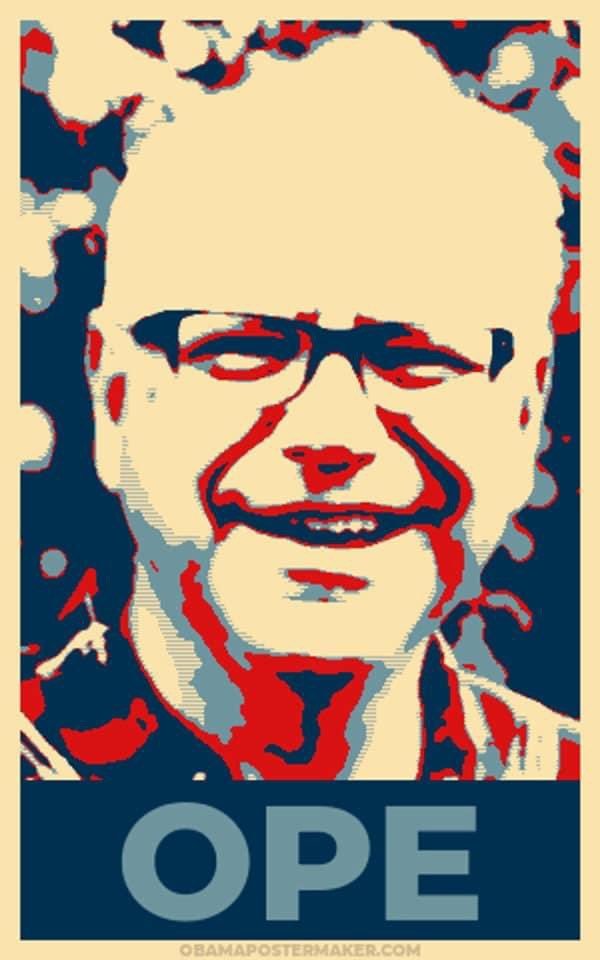
He loves mapping and GIS in policymaking!

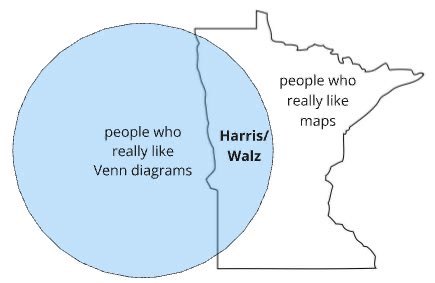
He wants to use taxpayer money to feed children, so scary
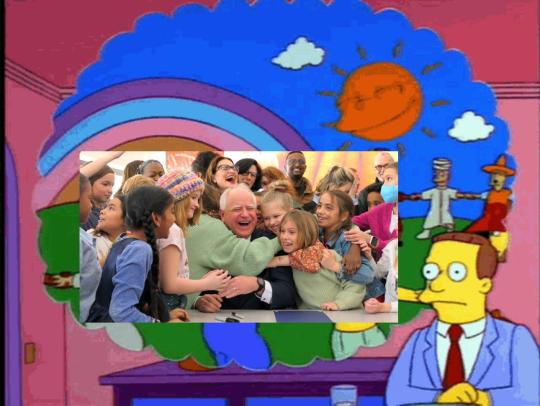
Do I agree with everything he's done? Of course not. I supported his opponent in the primary! Is he getting credit for the work of decades of progressive organizing he had no part of? Yeah definitely. Do I care? Not until after election day.
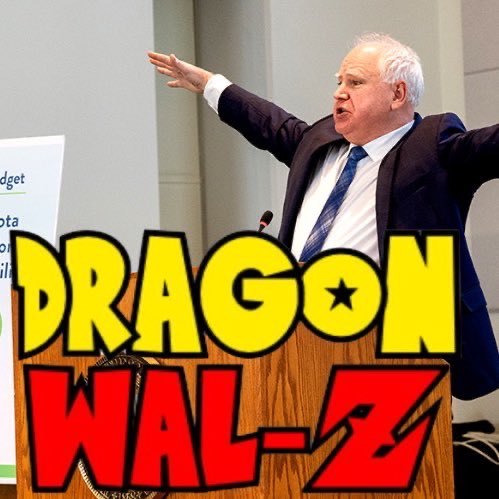
#us politics#tim walz#veepstakes#i dont live in MN anymore and havent worked in politics since i left#but that was basically my whole social circle so everyone has Opinions#some of which are for the group chat only and not for the general public lmao#but i am loving the memes because for once we might win the vibes election
14 notes
·
View notes
Note
If the far left think Walz is their new Great Antizionist Hope, they're in for a rude awakening. Walz is a Zionist, pro-Israel, and lowered the Minnesota flag for the Israelis slaughtered during 10/7. He's a two-state solution normie, like everyone else in America who possess at least two brain cells.
The Harris/Walz campaign is going to be about Team Normies vs Team Weirdos. And Hamasniks are right there in Team Weirdos, alongside the GOP and RFK Jr.
I wonder why the pro-Pals objected to the one Jewish guy in the running… 🤔
13 notes
·
View notes
Text

#us elections#us politics#kamala harris#vote kamala#kamala 2024#tim walz#veepstakes#2024 elections#election 2024#minnesota#destiel news#destiel putin election#destielputinelection
15 notes
·
View notes
Text
For anyone disappointed that Harris chose Walz over Shapiro, in addition to her clicking with Walz, from what I've read he was the only one who told her his job was to support her during their meeting.
Shapiro on the other hand, had a lot of demands about being a very active VP. Fetterman, (a senator from the same state as Shapiro), even told Harris he didn't think Shapiro had the right temperament to be vice president, since they don't have a big role once in office. He's popular in PA, but he wasn't a good fit. I think Shapiro wants to be president instead. If you're a fan of his I absolutely think you'll have a chance to vote for him as he runs for that job at some point. (Assuming trump doesn't win, and we don't have actual elections anymore.)
I didn't know anything about Walz, and had actually thought Kelly would be the best choice. I don't think anyone can argue with the results of having Walz on the ticket though. :)
6 notes
·
View notes
Text
4 notes
·
View notes
Text
Noah Berlatsky at Public Notice:
Two weeks ago, Minnesota Gov. Tim Walz was largely unknown nationally. Today, he’s a widely beloved Democratic figure and a leading candidate to become Kamala Harris’s running mate. It’s a startling and disorienting political ascent. How did it happen?
Part of his sudden success is due to Walz himself, whose avuncular charisma plays well on television, and whose strong record in Minnesota gives him a lot of bragging rights. Walz has also benefited, though, from the fact that progressives and the left have settled upon him as a pragmatic compromise. Left presidential preferences over the last decade have been dominated by Bernie Sanders, a unique and to some degree anti-establishment figure who promised to seize the party from its current leadership and turn it into a vehicle for radical change. Walz is a very different politician, and his embrace by progressives suggests a new willingness to work within the Democratic Party. That willingness might translate into more influence within the coalition. It also might signal greater Democratic strength and unity.
Walz’s wins
A lot of Walz’s recent national success is directly the result of the talents of one Tim Walz. Before running for office, Walz spent 24 years in the National Guard and worked as a high school history teacher in Mankato, where he helped form Mankato West’s first Gay-Straight Alliance at a time when LGBT people were marginalized. Walz has a long and impressive record of electoral, personal, and policy successes in Democratic politics. He was elected to Congress from a rural southern Minnesota district in 2006, a year Democrats picked up 30 seats, and was elected freshman class president by his colleagues. His local focus and popularity allowed him to hold the seat through the red waves of 2010 and 2014. Trump won the district by 15 points in 2016. But even then Walz wasn’t dislodged, winning the district by a point. Walz is in fact the only Democrat to win the seat since 1992. Before his 2007-2017 tenure and afterwards, it’s been in GOP hands.
Following his 2016 victory, Walz ran successfully for governor in 2018 and won reelection in 2022. Ahead of his second second term, Democrats won a two-vote Democratic majority in the state House and a one-vote majority in the Senate. That gave them a trifecta and full control of state government for the first time in a decade.
[...]
Progressives for Walz
Walz has also benefited, though, from a swift and unusually coordinated progressive effort to elevate him. To be clear, Walz is popular within the party. However, many progressive pundits and activists with large platforms have been especially enthusiastic about his candidacy. Gun control proponent David Hogg has been promoting Walz relentlessly; so has left journalist Mehdi Hasan; so has YouTube influencer Kyle Kuczynski.
Noah Berlatsky wrote in Public Notice about how Tim Walz makes a lot of sense as Kamala Harris’s running mate.
68 notes
·
View notes
Text
Felon Seeks Vice
Trump’s VP Search and the Politics of Impotence
TIMOTHY SNYDER
JUN 16
Usually, vice-presidential candidates are selected for virtues. They are expected to bring new voters in November, to complement the presidential candidate, and to be qualified to be president in case of emergency.
Donald Trump is searching, quite literally, for vice.
Trump is not so much trying to win an election as he is trying to gain power, so he needs someone who agrees with his Big Lie that he won the election last time, and who will stand with him during his second coup attempt. He does not contemplate ceding power at any later point, so the question of the qualifications of a vice-presidential candidate is not so relevant.
The vice-presidential candidate cannot be seen to complement Donald Trump, since as a Leader he cannot be seen to have any shortcomings or flaws. His is a specific kind of fascism, though, without any plan beyond retribution. Trump's backers at home and abroad understand that the rage will provide cover to dismantle the operations of the American government -- so that oligarchs need not pay taxes, for example, or so that Russians can commit atrocities in Ukraine.
And so those who wish to join the Republican ticket as the vice-presidential nominee must prove not their worth but their worthlessness. They must demonstrate that they do not challenge Trump in any way, and that they would not, should they become president, provide any resistance to those who would like to see American government fail. They must engage, in other words, in a politics of impotence, a determined effort to show that they lack determination.
Vice signaling is tricky, of course, both for them and for Trump. They have to be bad, without being too good at being bad. Appearing to be the frontrunner is dangerous, since it can be seen as ambition and talent, which Trump will not like.
According to Michael C. Bender's reporting in the New York Times, the frontrunners are Doug Burgum, Marco Rubio, and J.D. Vance. Trump has also brought Tim Scott to the attention of donors. I am not claiming to have any inside information or special insight as to whom Trump will pick. In different ways, each of these men demonstrates the contortions of the politics of impotence. As will any other possible candidate.
In media appearances, Tim Scott is craven in his defense of Trump's Big Lie and coup politics. But the submissiveness is so palpable that it would make the choice of an African-American unsurprising. Marco Rubio has obvious political ability, and eight years ago was seen (and clearly saw himself) as a plausible alternative to Donald Trump. He has since caved completely, after being humiliated by Trump in that campaign. He does though have a long list of historical zingers about Trump ("friends do not let friends vote for con artists"), which the internet will not forget. And Rubio has not pushed too openly for the vice-presidential slot. That whisper of a shadow of dignity might be too much for Trump to handle.
Doug Burgum has the problem that he is a successful businessman, the thing that Trump pretends to be -- the basis of his con, as the Marci Rubio of 2016 might have put it. Trump's reputation as an entrepreneur rests on his performance in The Apprentice, in which he played the role of a tycoon who could hire and fire. In fact, his wealth is inherited, and the businesses and initiatives he has attempted to found (or endorsed) have been flops: anyone remember Trump Vodka, Trump Fragrances, or Trump Mattress? Trump's cash position depends upon an inviting deception: I am already wealthy, so give me your money so that you can feel like you are a part of my success. The presence of Burgum on the ticket will make this con harder, because the press will then focus on Burgum's actual success in founding a software company and his actual wealth. (If I am wrong and Trump is thinking about gathering votes, Burgum has another problem: Trump is going to win North Dakota anyway, and Burgum's profile as a supporter of a total abortion ban will hurt Trump in states he needs to win.)

Of these four, J.D. Vance is the one who has most consciously worked out a politics of impotence.
Vance is a man of considerable intelligence and the author of an appealing memoir. Hillbilly Elegy leads the reader gently to a political conclusion: because Vance believes that his relatives were not helped by government assistance, we should all agree that government should do nothing to help people. The political nihilism presented as family history is a powerful Republican brew ("libertarianism"), and it has served Vance well.
Government inaction is of course a nonsensical prescription for the people of Middletown, Ohio, where Vance was raised, or for Appalachia, which is the focus of the memoir. Like everything about Vance, what the memoir does is suppress any idea of positive policy in the service of a politics of impotence. A politician is someone who explains why nothing can be done.
After his graduation from Yale Law School, where the memoir ends, Vance became a venture capitalist and a client of Peter Thiel, the Silicon Valley billionaire. Thiel adds a very specific and interesting philosophical layer to the politics of impotence. He is a follower and interpreter of the brilliant French literary critic René Girard, best known for his theory of scapegoating. (I should say that I once gave Girard Lectures in Paris and Stanford funded by an initiative of Thiel and that I teach Girard).
Girard challenges the typical view that societies begin from a reasonable consensus that we should all cease to be violent and instead accept a legal order. He claims instead that such a moment of social integration requires a scapegoat, someone who can be blamed for prior chaos and be subject to immediate symbolic violence now to integrate everyone else. In his commercial and personal ventures, Thiel practices what might be called positive Girardism, seeking after structures that allow people to flourish as individuals without the temptation to be conformist and scapegoat. In his politics, however, Thiel practices what might be called negative Girardism, supporting political candidates (such as Vance) who can be trusted to practice scapegoating and cultivate culture war. This keeps government dysfunctional and allows Silicon Valley billionaires to continue to shape society as unchecked oligarchs (this is also called "libertarianism").
As a senator, Vance has modeled a politics of impotence extremely well. In both domestic and foreign policy, his line is that American government is helpless. In international relations, he repeats Russian propaganda claims about Ukraine, in the service of the doomer view that no one can resist Russia and that we should all give up. But it is a booming sort of dooming: Vance likes to get in front of microphones, puff out his chest, and present impotence as masculinity. There is guile in this performance: the manly pose substitutes for manly action. A tough guy à la Vance returns to the safe space of provoking cultural anxiety by choosing enemies within his own country.
There is enormous political potential in Vance's approach. In the short run, he has proven with his wits that he can always transform the need for action into a rhetoric of aggressive hopelessness, something that will please a certain kind of right-wing donor. In the long run, he can attract the support of leaders of countries who like to see America weak, just as Trump has done. It is not at all hard to see a future with Vance posing alongside Orbán, Putin, and Xi as makers of an unfree world.
And the possibility of such a grand trajectory, of course, is a problem for Vance right now. He is young. He has much more potential than Trump himself, and Trump will at some point figure this out.
Like some of the others, Vance was also once a Never Trumper ("when we apologize for this man, Lord help us"). Vance's reversal, however, can be seen -- uniquely -- as part of a larger understanding of politics. One gives up in the face of a challenge, and does so performatively, aggressively. In this way, one transforms politics into an impotence display, training voters to think that government is just a kind of stage, on which our best leaders vent our feelings, rather than actually do anything.
Trump was a pioneer of this, but Vance is younger, smarter, and better. He clearly knows what he is doing: just before each outburst, you can detect a quick moment of calculating pleasure around his eyes. As he gathers himself, he looks, just for a split second, like someone who is about to tell a joke that he very much enjoys.
Such are the contradictions of the politics of impotence. A Tim Scott might be too soft to make any sort of impression. A Marco Rubio might have too much of a residue of dignity. A Doug Burgum cannot efface his own successes. And a J.D. Vance, precisely because his politics of impotence is so thoughtful and practiced, reveals a level of intelligence and skill that will make him a better Trumpist than Trump himself. As a performer, Vance is only getting better, while Trump is only getting worse. Is that something Trump will be able to tolerate?
3 notes
·
View notes
Text
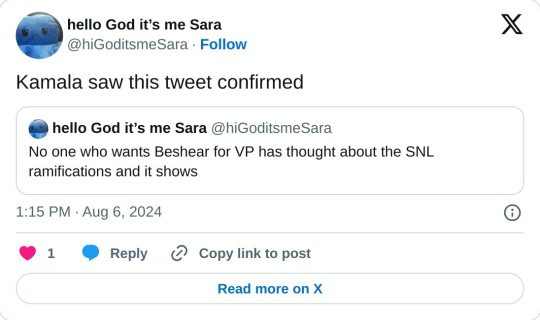
2 notes
·
View notes
Text
If Harris picks Walz, he will forever be known to me as Vice President Hot Dish
Edit: VICE PRESIDENT HOT DISH IT IS!!!
6 notes
·
View notes